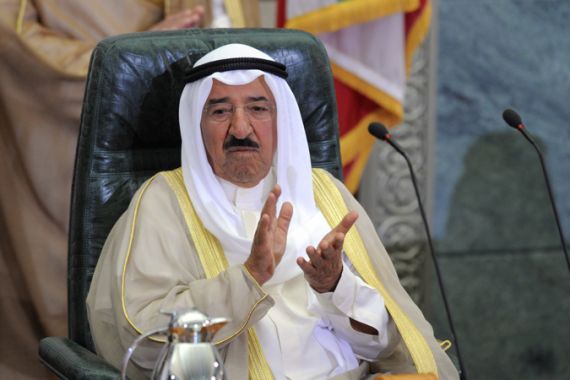Kuwaiti Emir dissolves parliament
Following cabinet request, Emir Sheikh Sabah al-Ahmad al-Sabah issues decree to annul 2009 court-reinstated parliament.

Kuwait’s Emir has issued a decree dissolving the 2009 parliament, just over three months since it was reinstated by the constitutional court.
“An emiri decree was issued to dissolve the 2009 parliament,” said state-run Kuwait television on Sunday.
The dissolution of the assembly has been a main demand of the opposition and the action paves the way for snap polls.
The Emir, Sheikh Sabah al-Ahmad al-Sabah, had been widely expected to take the step following a cabinet request to
dissolve the assembly.
The 2009 pro-government assembly was dissolved in December following protests amid allegations of corruption against some of its members and former prime minister Sheikh Nasser Mohammad al-Ahmad Al-Sabah who also quit.
The opposition scored a massive victory in the February legislative polls but four months later the constitutional court nullified the election, scrapped parliament and reinstated the 2009 assembly.
The cabinet of the oil-rich Gulf state recommended on Wednesday that the parliament be dissolved.
Under Kuwait’s constitution, fresh general elections must be held within 60 days or before December 7.
The forthcoming polls will be the second this year and the fifth since June 2006.
Turmoil
The dissolution comes less than two weeks after the constitutional court rejected a challenge by the government against the electoral constituency law and ruled that the legislation was in line with the constitution.
The law, which divides the oil-rich Gulf state into five electoral districts, was passed by parliament in 2006 following popular rallies demanding reform of the electoral process.
The cabinet said the decision to dissolve parliament was based on the fact that the assembly failed to hold any meeting after it was revived despite being invited to meet on July 31 and August 7.
The reinstated parliament was boycotted by the opposition on the grounds that at least 13 pro-government MPs in the 50-member house faced allegations of receiving bribes.
The turmoil has also held up investment projects and economic reforms.
OPEC member Kuwait has been rocked by a series of political crises since 2006 during which the government resigned nine times.